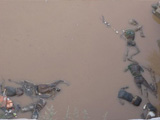|
|
TODAY.AZ / Weird / Interesting
Fishing for dead bodies – a morbid yet profitable business?
15 December 2010 [16:27] - TODAY.AZ
 Fishing dead bodies is a well known practice in China since ancient times, when some fishermen dedicated their time to recovering bodies from the waters and then returning them to their families. Back then, this “job” was appreciated and respected, and the fisherman himself wasn’t rewarded with money but an immense gratitude.
Fishing dead bodies is a well known practice in China since ancient times, when some fishermen dedicated their time to recovering bodies from the waters and then returning them to their families. Back then, this “job” was appreciated and respected, and the fisherman himself wasn’t rewarded with money but an immense gratitude.With the evolution of the country, both economical and demographic, fishing for dead bodies soon became a thriving business for most of the fishermen on Yellow River, with younger and younger boys taking up the task, every day.
The most “offering” place, as they themselves assert, is at about 18 miles down stream from Lanzhou, the provincial capital of Gansu, northwestern China, a place where a hydroelectric dam and a bend in the river cause the bodies to surface.
One of the many fishermen on the Yellow River who took over this macabre task is 55-year-old Wei Xinpeng. Although until 2003 he had a radically different occupation, running a pear orchard, he realized that fishing for bodies can be far more profitable. His “business” has been gradually growing, Mr. Xipeng is now recovering 80 to 100 bodies a year, both male and female, young or old, victims of drowning, suicide or murder.The man recovers them from the water and takes them to a fisherman’s cove were they are left floating with their faces down to preserve their features.
And because it’s said to be a profitable business, here is the explanation: Mr. Xipeng charges different amounts depending on his clients’ apparent income. For example, he asks around $75 from a farmer, $300 from an employee and reaching up to $450 if a firm is the one paying. There have also been cases of bodies that were been released back into the river because families either didn’t claim them or just didn’t want to take them. Mr. Xipeng says “Most of the bodies that are not claimed by relatives are female migrant workers who had moved to Lanzhou . Most of them have been murdered”
Wei Xipeng believes that China’s economic boom is mostly to “blame” for the increasing number of deaths and he might just be right as the number of people committing suicide has been growing, mostly in women from China’s rural areas, and according to the World Health Organization 26% of world’s suicide cases take place in China.
What is very little known in the West is that Chinese director Zhou You recently released a 52 minutes documentary called “The Other Shore” on this particular subject, illustrating how an ancient, once private service was made into a profitable one. In an interview for Global Times, director Zhou said “Salvaging bodies out the river used to be a voluntary act of boatmen in olden times. They returned the bodies as a favor. That time is over, and younger people have developed it into a business.”
Mr. Xipeng isn’t the only fisherman on China’s Yellow River doing this, but he might just be the only one with another reason besides money, as he claims:
“My own child died in this river and I could not find the body. It was very painful. That’s why I started doing this job.”
It seems that at least for now Wei Xipeng had to give up on his fishing for bodies as he admits in an interview for CNN “I can’t go out on the water anymore. The police have already fined me several times. They don’t like what we’re doing. As for the money I used to make, I just don’t make it anymore.”
Although warnings have been released into the media for all the fishermen, others continue doing their job, assuming the risks that come with it.
/OddityCentral/
URL: http://www.today.az/news/interesting/78213.html
 Print version
Print version
Views: 2081
Connect with us. Get latest news and updates.
See Also
- 23 January 2025 [23:20]
Dubai once again named cleanest city in the world - 06 December 2024 [22:20]
Are scented candles harmful to health? - 23 November 2024 [14:11]
Magnitude 4.5 earthquake hits Azerbaijan's Lachin - 20 November 2024 [23:30]
Launch vehicle with prototype of Starship made its sixth test flight - 27 October 2024 [09:00]
Fuel prices expected to rise in Sweden - 24 October 2024 [19:14]
Turkiye strikes terror targets in Iraq and Syria - 23 October 2024 [23:46]
Kazakhstan supplied almost entire volume of oil planned for 2024 to Germany in 9 months - 23 October 2024 [22:17]
Taiwan reported passage of Chinese Navy aircraft carrier near island - 23 October 2024 [21:50]
Russia remains largest oil supplier to India - 16 October 2024 [17:54]
Gamesummit co-founder shares insights on future of gaming industry in Azerbaijan [EXCLUSIVE]
Most Popular
 Russia’s potential moves spark debate amid Tartus lease termination
Russia’s potential moves spark debate amid Tartus lease termination
 Uzbek FM: Tashkent supports further strengthening of strategic relations with Baku & Ankara
Uzbek FM: Tashkent supports further strengthening of strategic relations with Baku & Ankara
 West try to blackmail Georgian authorities
West try to blackmail Georgian authorities
 Ankara Declaration strengthens trilateral cooperation between Azerbaijan, Türkiye, and Uzbekistan
Ankara Declaration strengthens trilateral cooperation between Azerbaijan, Türkiye, and Uzbekistan
 Will Trump save Menendez?
Will Trump save Menendez?
 Lowering age of criminal responsibility discusses in Sweden
Lowering age of criminal responsibility discusses in Sweden
 Georgia reaffirms commitment to regional stability during visit to Armenia
Georgia reaffirms commitment to regional stability during visit to Armenia
